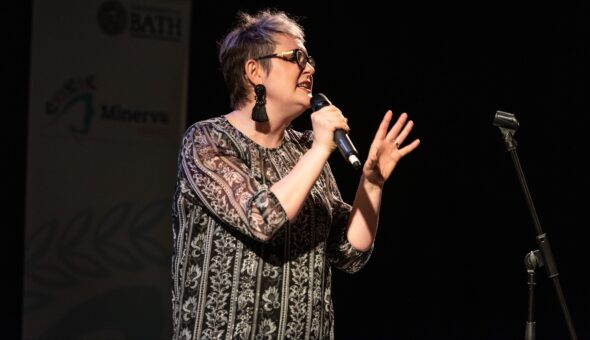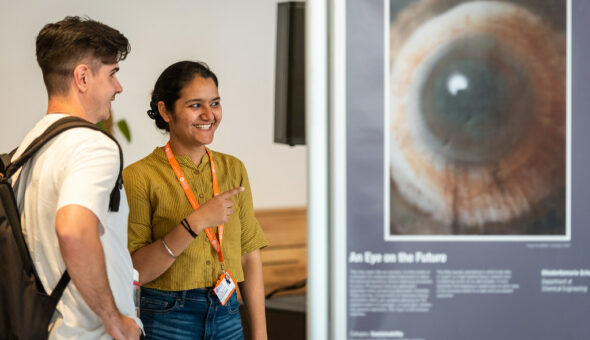Around this time last year, we, along with colleagues at Bath Spa University, University of Bristol, University of Exeter and University of Plymouth, submitted our grant application to the European Commission to run a European Researchers' Night event blissfully unaware of what 2020 had in store. It's fair to say that the event we ended up running was pretty far removed from the event we intended to run, so we wanted to share some of our experiences of running a research engagement festival in a time of COVID-19.
FUTURES: European Researchers' Night
Since 2018 FUTURES has been a public engagement collaboration between the University of Bath, Bath Spa University and the University of Bristol. In 2020 we broadened our consortium to include two other universities here in the South West of England, University of Exeter and University of Plymouth, alongside cultural events producers Agile Rabbit. FUTURES has been Funded by the European Commission under the Marie Skłodowska-Curie actions as part of European Researchers' Night.
Through FUTURES, we aimed to engage communities across the cities of Bath, Bristol, Exeter and Plymouth, and the wider areas of Devon and Cornwall with research in fun, entertaining, and inspiring ways. We also aimed to support researchers in the development of their public engagement skills and expertise.
Taking research to where the people are
Taking research to where the people are was at the heart of our plans for FUTURES2020. Working with researchers, we'd developed activities that would have seen them heading out into shopping centres, hospitals, botanic gardens, museums, cathedrals, naval vessels, aquariums and the streets to engage people with their research.
The community and cultural organisations we'd intended to work with were the ones hit hardest by the COVID-19 emergency. Between finding out our application was successful in May 2020 and European Researchers' Night in November 2020, those places and spaces closed, re-opened, and closed again.
Despite the challenges we faced in our event planning, we were keen to still involve those venues and organisations and ensure they and their audiences felt involved as much as possible, mindful of their needs during such uncertain times.
Face-to-face to online
With every shift in government guidelines, our plans had to change with activities forced to adapt and adapt again in our shift from a face-to-face to an online festival. Faced with the health emergency challenges, we asked ourselves, how do we provide meaningful engagement opportunities with social and cultural lives migrating online? How do we ensure we can engage people who may not have access to online platforms?
The FUTURES2020 programme consisted of 42 events running on Friday 27 and Saturday 28 November and 260 researchers. We included a diverse range of online event formats, including online talks, discussions, games, lectures, participatory workshops, quizzes and exhibitions. The programme also tested the idea of social media 'events' with our Twitter Science Show, FUTURESxInstagram collaboration with the Natural History Consortium and Reddit AMAs. We also created a suite of 'remote' or 'offline' activities include co-produced radio programme shows broadcast on community radio stations across the South West.
What are we taking away from this experience?
Running a research engagement festival during a global health emergency certainly tested all our skills as public engagement professionals, but we've developed some useful insight through this process.
Engaging wider and further
The decision to move to a wholly online festival meant the team collectively upskilled ourselves in using various online platforms. However, online engagement activities allowed FUTURES2020 to have a significantly wider reach across the South West region and beyond. The use of online experiences also enabled participation from people who might have faced barriers to coming to in-person events and created a more inclusive approach to the programme.
Active engagement
It could have been easy to create passive engagement experiences for public participants, but the FUTURES team wanted to make engagement for participants as active as possible. This took many forms, including an online quiz, downloadable resources for school groups and experiments and tasks for children (and parents) to try at home. We also created participatory workshops that used a mixed method of physical activities that participants did together in an online space that allowed for more meaningful interactions with each other and with the researchers.
The participants' feedback also suggested it was valuable to involve skilled facilitators who could set the scene, model behaviours, and create conditions for people to discuss and interact with researchers. While these may be taken for granted with in-person events, it seems people value them even more with digital events.
Sticking with FUTURES2020
The number of researchers who took part and the commitment of cultural and community organisations, such as the S.S. Great Britain and the Natural History Consortium, to stick with FUTURES2020 despite the many changes, clearly demonstrates the value they all place on public engagement.
Developing researchers' skills and capacity
As well as having the chance to engage people with their research, the most significant outcome for participating researchers was the opportunity to develop new skills in digital engagement. Offering training and professional development opportunities in a range of associated techniques such as storytelling, video making, and social media use was clearly valued by participating researchers and has helped build capacity for online engagement that will be useful to them beyond public engagement activities.
Sharing public engagement skills and expertise
FUTURES2020 has been an opportunity to collaborate with public engagement peers and colleagues from across the consortium universities in ways that wouldn't have otherwise happened. The need to respond effectively to the challenges created by COVID-19 and homeworking tools has resulted in more effective collaboration than in previous years. We’re already plotting some other ways to work together on some exciting public engagement projects.
Reflection on the ‘rush to online’
FUTURES2020, like other examples of engagement activities that migrated online during the COVID-19 pandemic, had to quickly redevelop activities to consider what was possible to do in the online space whilst also meeting the commitments made to our funders, the European Commission.
While most of the events for FUTURES2020 were what you might expect from an online festival, it was important for the FUTURES team to try to ensure the practices we expect in face-to-face engagement were part of the online engagement experience for participants. We created spaces and activities for researchers to listen to and engage in dialogue with people. These included the small scale 1-2-1 conversations in the Curiosity Carousel, Reddit's Ask Me Anything's, participatory workshops like Gathering for a Future or How to fix a broken planet and the social media event FUTURESxInstagram.
We, as a team, also quickly identified the risk of exclusion associated with the online-only engagement. A range of people may not have the capacity (attitude, digital fatigue, the difference in risk perception of in-person activities) or capability (access to devices, bandwidth, skills) to engage with content in a digital festival.
To mitigate this risk, the FUTURES2020 programme included several remote engagement activities. This included the Letters to My Kidney workshop that allowed people to engage with a workshop through the post, artwork inspired by research exhibited in the windows of an empty shop on the high street in Exeter and FUTURES on Air, a series of co-produced radio shows between community groups and researchers broadcast on five community radio stations across the South West.
These activities allowed FUTURES2020 to create community-led engagement opportunities, were offline and more closely reflected participants’ interests.
Would I recommend running a festival in the middle of a global pandemic? Probably not, but it was a great opportunity to try some new stuff out, support researchers to develop their skills, work collaboratively with colleagues and learn about some exciting new approaches to engagement.
FUTURES2020 received funding from the European Union’s Horizon 2020 research and innovation programme under the Marie Skłodowska-Curie grant agreement No 955253
Dean Veall is Deputy Head of Public Engagement at the University of Bath
Respond


